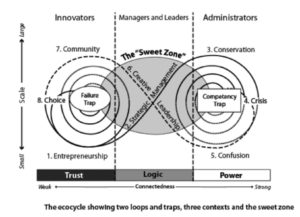In the countryside of Brazil, some communities survive with sales of handicrafts made with flower stalks of golden-grass, a plant that grows in the humid fields of Brazilian Cerrado (Syngonanthus nitens). To maintain the continuous growth of golden-grass, experienced harvesters traditionally use controlled fire, every two years, to renew the flowering of the golden-grass. Controlled burning destroys all mature vegetation, but golden-grass is resistant to fire and reborn, occupying the fields.
The local harvesters that use fire to manage the golden-grass do so by knowing the cyclical nature of the forests. At first, there are lots of weeds in the open paths that grow in variety with equal access to light and water. As the forest gets older, the variety of vegetation decreases because larger trees reduce access to other vegetation to get light and water. Finally, the mature forest becomes homogeneous and when the trees are old they turn to be natural fuel for the fire that destroys the mature forest. In a natural process of rebirth, the forests renew themselves in cycles.
As in nature, the organizations where we work also follow a cyclical evolution. In the book “The New Ecology of Leadership”, David K. Hurst proposes a mental model that allows us to understand this cyclical and dynamic movement of the organization analogous to the dynamics of nature. This mental model is called Ecocycle.
I will briefly describe the idea of the Ecocycle to provoke you and draw your attention to the reflective purpose of this post. However, consider reading David K. Hurst´s book for a proper understanding and application of the mental model in your particular context.
The Ecocycle applied to organizations allows us to visualize three phases of organizational development.
The Trust phase is the initial phase of the business, where the organizational structure is more informal, the processes are in construction, and the employees are involved in a multifunctional execution of activities.
As the business evolves, the organization goes to the phase of Logic where the scales are larger and more specialization in the execution of activities is required. There are many operating systems running on a daily basis and an increase of abstraction in the business evaluation with the introduction of specialized reports and analyses that are crucial for the management of large business volumes.
The phase of Power is the moment when the organization is already mature and solid, more bureaucratic and full of controls.
“Nothing fails like success because we don´t learn from it. We learn only from failure ” Kenneth Boulding.
On the top of the organizational success, two scenarios can come next. Crisis and confusion can lead to the decline of the organization, which, by falling into the trap of stability, will need to tread a path of rebirth.
Another alternative is to get away from the stability trap and stick to what David K. Hurst calls the “Sweet Zone,” which is a zone of a dynamic balance where organizations invest in both innovations and in the exploitation of their existing assets.
To be in the “Sweet Zone” is not that simple; the organization needs to make a special effort to maintain an appropriated balance of forces among power structure, operating systems, management focused on people development, and organizational culture.
After this brief description of the Ecocycle and its application to organizations, I would like to invite you to look at this dynamic model with another focus, the professional journey of each one of us.
You probably realized the shape of the infinity symbol in the Ecocycle diagram that brings us the idea of cycles that repeat and evolve forever. In this perspective, I invite you to make some analogies.
The phase of Trust in the Ecocycle can be correlated with the beginning of a career when we put a lot of creative energy in many different projects, and we allow ourselves to try different activities within our professional area.
In the analogy with the forest, this is the time when the fields are open and there is a wide variety of vegetation. In our careers, the multiple projects in which we invest time and energy represent the many opportunities for learning and innovation. At this stage, we are not too afraid to make mistakes because we have a long professional life still to be developed.
The phase of Logic is the moment of the professional journey in which we find that work activity where our skills seem to fit perfectly. It is the moment of the career that for many people comes with new positions, new responsibilities, promotions, MBAs and specializations, a moment of relevant professional growth.
After the ascending phase, as in nature, there is the most successful moment that in some cases may end up in a trap of stability. In that case, after success comes the decline that often demands an unplanned rebirth effort.
At the beginning of the post, I mentioned the golden-grass that by the handling of fire is renewed in cycles. Using the analogy of nature, I believe that our professional journeys are also like golden-grass and require a periodic renewal. Innovation and learning need to come in cycles so that as professionals we are always in the “Sweet Zone” balancing the investment in our already acquired skills, but also generating space for learning and new experiences.
In an analogy with the planned burnings of golden-grass, our careers from time to time need to go through a controlled fire. It is the moment when we silence our most successful habits of the past to try some new habits that will help us to continue on a successful professional journey with the innovation needed to build our future.
What I call controlled fire for a professional journey can be a planned career transition project, the investment in a new business, the development of skills in new areas of knowledge, and many other projects that allow innovation to be incorporated into our knowledge and acquired experience.
Dear reader, how are you creating space for innovation in your professional journey? Share with us.
Hurst, David K., 2012, The New Ecology of Leadership: Business Mastery in a Chaotic World, ISBN 978-0-231-15970-8, Columbia University Press
Special Thanks for Dr. Leslie Breitner that kindly revised this post.
Post illustration – photo credit – liwidera on VisualHunt


As a Biologist, it is very pleasant to see a comparison between the corporative environment and one ubiquitous theme in Biological Sciences: ecology.
Golden-grass is a monocot angiosperm, which means its reproduction involves the flowering process. A substantial transformation that, despite all of its inherent differences from other plant tissues, is an indispensable step for the organism reproduction, growth, and survival.
A parallel to business and corporation could be understood as the necessity to keep an eye on changes that may lead to expansion, instead of putting all the coins and chances in what seems safe, organic, and it is already consolidated. A challenge indeed, as moving forward and beyond may imply in explore fields that may be “abandoned” or may have “other and new predators”. Having said that, at some point it might seem comfortable and safe not to move. But cycles are dynamic. To move when you do not have, while it is still optional, may provide advantages as there is time to analyse and choose pathways. Running for survival, on the other hand, may not give you this advantage. But may lead you to unforeseen discoveries.
Which way is yours?